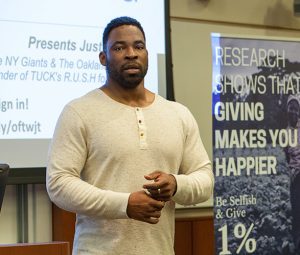Wharton MBAs, Justin Tuck, Challenge Classmates

“If every MBA pledged just 1 percent of their post-MBA salary to charitable giving, what might be the potential social ramifications?” That was the question Kate Epstein and Josh McCann sought to answer when they were MBA students at the University of Pennsylvania’s Wharton School. The 2014 graduates would go on to found One for the World in an effort to make philanthropic giving easier, and even capturing the attention of former NFL star Justin Tuck.
McCann first proposed the idea as part of speech assignment, and Epstein came on board to help grow it into an organization with chapters at universities all over the country that focus on giving back in significant ways. With more than 300 members across six schools, the One for the World movement has impacted charitable donations around the globe—and its influence continues to grow.
More recently, former NFL New York Giants and Oakland Raiders player Justin Tuck, a 2018 Wharton graduate, sought to encourage participation among current students as part of an April One for the World “Lunch and Learn” on campus. He discussed the importance of giving now, advising attendees not to wait to give until the have “more money.” Tuck explained that giving just 1 percent of your salary now won’t really impact your bottom line and has the potential to make a major difference in the world.

Former NFL player Justin Tuck speaks at an MBA lunch event / Photos by S. Nibras Islam.
Tuck, who himself has taken the pledge, talked about how the organization made an impact on his personally. “One for the World has lowered the boundary of entry for giving to kaput. I don’t have to perform due diligence on how much of what I’m kicking in is furthering the mission— they’ve done that for you.”
This year has been Wharton’s most charitable year thus far. The MBA Class of 2018 has pledged more than $86,000 to various charities, with 13 percent of the class taking part. As for where those donations have made a difference, One for the World carefully vets each of its philanthropic organizations to analyze the ones that are most effective.
In just four years, that charitable impact has afforded 400 years of healthy life to people around the world, provided clean water to more than 28,000 people, donated health products and services to more than 10,000 people, and much more.
For Tuck, the key to giving is to simply hit the ground running. “There’s opportunity and need everywhere. Find something you’re passionate about.”
To learn more about One for the World, read the full news story on the Wharton MBA website.
This article has been edited and republished with permissions from our sister site, Clear Admit.
Berkeley Charity Study Examines How We Often Dehumanize Those in Need

An often-seen angle of charity is that the recipient is down on their luck, destitute, and in need of outside assistance; but that imagery may play into a indirect dehumanization of those in need, and make things worse than before, writes Berkeley University Haas School of Business assistant professor Juliana Schroeder.
Schroeder, who’s research focuses on “judgment, decision-making, and interpersonal and intergroup processes,” criticizes the way in which charities like Sally Struthers’ Christian Children’s Fund portray its aid recipients as helpless victims may “unintentionally send a signal they have low mental capacity.”
“Charities want to motivate people to give more, but they may also make people think poor people don’t have the ability to take care of themselves. If you perceive of someone as having less mental capacity to think or feel, then you are subtly degrading and dehumanizing them,” she explains.
Schroeder, along with Northwestern’s Adam Waytz and University of Chicago’s Nicholas Epley, published a new study in the Journal of Experimental Psychology, which reveals “fundamental truths about how people think about giving and receiving aid.” The researchers found that not only do people act “more paternalistically towards those they believe have lower mental capacity,” but that they also “often believe they have more mental capacity than others.”
Schroeder explains, “When you think of a person having less self-control and willpower, you think they will make bad decisions and will be more likely to waste the aid. They don’t know what is good for themselves. People are pretty convinced they have a lot of willpower, while others don’t have the same level of self-control.”
The good news is that these perceptions are malleable. By questioning them, we can begin to “question how our perceptions of ourselves and others may affect the way we behave.”
Schroeder concludes, “When you dehumanize an individual or a group it can affect how you help them. People can be more cognizant about the ways they are thinking about their own mental capacity and that of others and pause to get more information before they start helping.”
Foster School Professor Discusses Charitable Giving

There’s no doubt that the holiday season is one of the biggest times of year for charitable giving. That’s why one University of Washington Foster School of Business professor, Ann Schlosser, decided to research why we give to charitable organizations and causes. According to Schlosser, people don’t give because they’re trying to “keep up with the Joneses” they give depending on how they feel they’re doing compared to others. Continue reading…
Foster Difference Fund Increases Diversity

According to UW Today, the 2016 University of Washington fall class was the most diverse yet. The university welcomed 976 underrepresented students, a new record number. But that’s not the only place where the university is encouraging diversity. The Foster School of Business also promotes diversity, and thanks to the Foster Difference Fund, the school was recently able to launch a few new initiatives and partnerships to help them reach their goal of inclusiveness. Continue reading…
Seattle Pacific University Brings 300 Shoes to Underprivileged Indians

Seattle Pacific University students brought more than 300 shoes to Delhi, India to help those in need. The students were heading to India in December and decided to do what they could to help. According to the Times of India, “Each one [Seattle Pacific University student] decided to drop their extra clothes and carry the shoes instead. Together, we could manage to bring 300 shoes to Delhi, from where they were transported to Lucknow,” said Anam Zaidi, a psychologist who started a fundraising campaign to buy growing shoes for slum kids. Continue reading…
Wilfrid Laurier Ranked #1 in Volunteerism by LinkedIn

LinkedIn recently ranked Wilfrid Laurier University number one in volunteerism based on an an analysis of 10 million professionals around the world who added “volunteer and causes” to their LinkedIn profiles. LinkedIn then looked at where these professionals attended university, and Laurier placed first in terms of the proportion of its students and alumni who listed volunteer experience. Continue reading…
